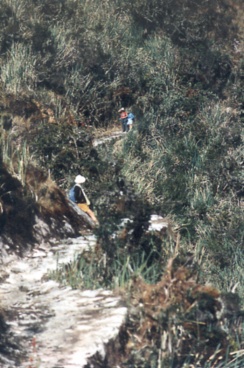|
|
|
|
How
it works
" Man can live without friends
Man can live without books ...
But civilized man
Cannot live without Cooks." ( Nessmuck ).
|
|
All Trip Leaders are Officially Licensed Professional, Mountain, River & Jungle Guides, with ample experience, complemented by an extensive knowledge covering a wide range of subjects and interests related to the Andean and Amazonian environment.
In the case of certain Special Interest Tours, this leadership is further supplemented by the presence of Academic and/or otherwise similarly Specialized Personnel such as Archaeologists, Anthropologists, Ornithologists, Biologists, etc. who are often directly involved in various forms of field work and research in those areas where tours are taking place.

The activities of the leaders and guides is complemented by a superb field staff composed some of the most loyal, hardworking, hospitable and honest people in the world: muleteers, porters, boatmen, scouts and pathfinders; all anonymous heroes, all committed to the success of the undertaking and the well being of its members.
|
|
|
Meals are prepared under very hygienic conditions by experienced expedition cooks. All cooking and commissary equipment is provided. Breakfasts include fresh eggs, pancakes and porridges. Lunches are prepared as portable or served hot or as buffets in scenic spots.

Hot soup or tea is generally served at intervals atop high passes or on cold days. Upon arrival in camp, high tea is served accompanied by breads, marmalades, etc. Dinners are always served hot and include a wide variety of soups and main courses of beef, fish, chicken, mutton and pastas but with a strong emphasis on local and native foods. Any special dietary requirements can be accommodated.
|
|
Participants are generally not required to partake in logistical or camping chores although they are not discouraged from doing so at their own initiative as long as this is not detrimental to the normal development of the expedition project. On treks all baggage -personal and camp- is carried on mule-back. An exception to this being made in the case of the Inca Trail to Machu Picchu Treks where human porters are employed due to regulations which prohibit the use of beasts of burden on the ancient Inka Road. A typical trekking day will seldom exceed 7or 8 hours of walking. Camps, whenever possible, are pitched near clean mountain rivers, suitable for bathing.
Hot washing water and wash basins are also available anytime in camp. Accommodations are in large, roomy and impermeable 8 x 6 ft. tents with a 4 ft.10 in. clearance.. Not more than two people are lodged per tent.. Separate large dining & kitchen tents are provided as well as latrine tent.

Creature comforts notwithstanding, the basic and indispensable ingredient for success will -nevertheless- always be the spirit and the attitude with which participants choose to undertake their adventure. If it be sound and fair, humble but not cowardly and valiant but not reckless, then all shall be well and the poet's words will ring true:
"... You will have had a fine moment, and looked down upon all the kingdoms of the earth. And, whether it was wise or foolish, tomorrow's travel will still carry you, body and mind, into some different parish of the infinite"
(Robert Louis Stevenson, "WALKING TOURS" ).
|
|

APU Expediciones was founded in 1981. The name "APU" was chosen by the field staff as the most appropriate for expressing the spirit of the project: for, indeed, in the native Quechua language of the Andes, the "APU" is the Spirit of the Mountain. Every mountain, from the highest snow capped peak, to the smallest neighboring hill, is an "APU". Each "APU" is different, with individual characteristics, and personalities -for they are alive, and cognizant, beings. They all have in common that from them emerge and are borne the life giving waters of springs, lakes and rivers as well as the forests and all creatures that dwell in them. It is a spirit of fertility and strength. The "APU" possesses the power of giving life and taking life. It is first to the local "APU", then to the further ones, and finally to the Mother Earth, that the highland peoples look to, toast to, and pray to for protection, for counsel and for success when undertaking a venture, a pilgrimage or an enterprise.
|
|